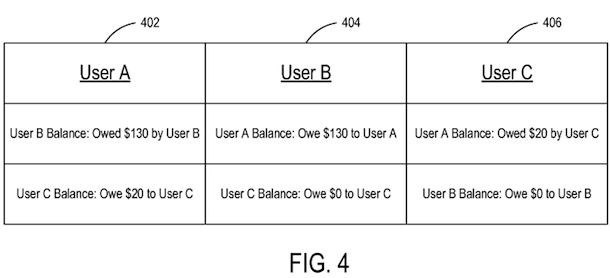Google Patents Method For Splitting Restaurant Bill & Other Shared Expenses
 Many of us now have smartphones, and almost all of us know how to use the calculator on these smartphones. Even so, not many of us are pulling out the calculator to itemize restaurant bills at the end of the night. It often ends up with folks splitting things evenly — which can be a hassle if everyone is paying with a card — or one person footing the bill and others promising to settle up, which doesn’t always happen. Google hopes to end this awkwardness with a recently filed patent.
Many of us now have smartphones, and almost all of us know how to use the calculator on these smartphones. Even so, not many of us are pulling out the calculator to itemize restaurant bills at the end of the night. It often ends up with folks splitting things evenly — which can be a hassle if everyone is paying with a card — or one person footing the bill and others promising to settle up, which doesn’t always happen. Google hopes to end this awkwardness with a recently filed patent.
“When the group incurs a bill, typically one of the group members will pay the bill out of convenience and expects to be paid back by the other group members,” the inventors, Google employees, explain in the patent. “However, some group members may not pay back their entire share of the bill or may forget and not pay back their share at all. This is unfair for the group member that paid the bill. Thus, there is a need in the art for an efficient way to track group expenditures and settle balances between group members.”
What the patent seems to describe is a new-fangled sort of ledger book that allows you and others in your group to keep track of who paid what amount for what and to whom, and who still owes money to everyone.
Look at Fig. 4 above and follow along below:
“[A]ssume that Users A-C have drinks at a bar and User B pays a bill of $45 for the drinks. User B adds the payment transaction as an expenditure of the group and allocates $15 of the transaction to User A, $20 to User B, $10 to User C. In this example, the balance module… would update the individual balances of Users A-C to indicate that User B now owes $115 to User A ($130-$15) and User C owes $10 to User B ($0+$10).”
Then there’s this example of a group of friends, conveniently named Friend 1, Friend 2, Friend 3, and Jim Friend 4:
While on vacation, one of the days only three of the friends (Friends 1-3) go eat lunch at a restaurant because Friend 4 is not hungry at the time. The bill for lunch is $60 and Friend 1 pays the bill using a mobile payment service available on his device… Friend 1 adds the lunch as an expenditure of the group. When the form is presented to Friend 1 for the lunch, Friend 1 indicates that the lunch should be allocated to Friends 1-3. The lunch is not allocated to Friend 4 because Friend 4 did not participate in the lunch. Further, Friend 1 provides the following amounts of allocation in the form: Friend 1 $25, Friend 2 $16, and Friend 3 $19. In this example, the amount of allocation for each friend is based on what each friend ordered during lunch.
Presumably, this system will end up in a mobile app — one that probably pushes Google Wallet as a way of making and collecting payments from friends — but for now it’s all just diagrams and explanations on the patent application.
No joke: Google wants a patent on splitting the restaurant bill [Geekwire]
Google Applies for Patent on Splitting Restaurant Checks [Eater]
Want more consumer news? Visit our parent organization, Consumer Reports, for the latest on scams, recalls, and other consumer issues.

